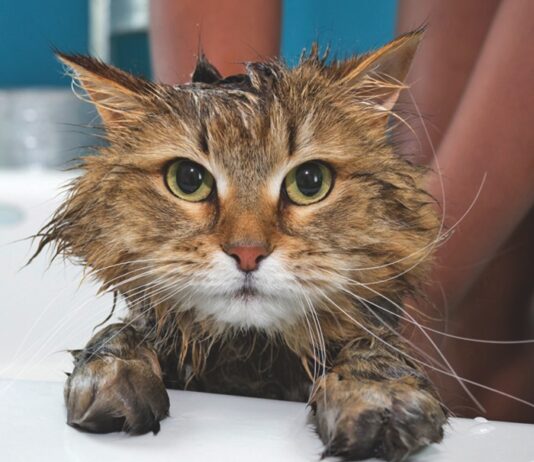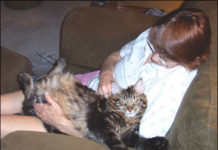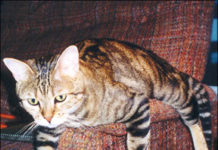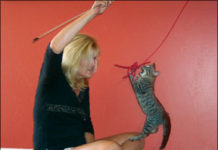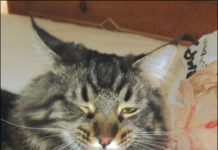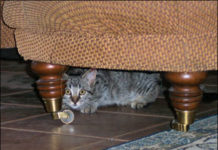Does Your Beloved Cat Bite?
It is safe to say that most people live with their cats without much concern about getting bitten. Alas, cats have been known to try to bite veterinarians and animal handlers. Frightened animals bite. But why do cats sometimes bite the people they live with? At times, the motivation for aggressive behavior is clear. Yet there are also situations where aggression is just plain difficult to understand. Cats may behave aggressively during procedures such as grooming or nail clipping. A certain degree of restraint is needed to perform these manipulations. Since cats feel trapped when restrained, they may struggle or bite. It may be possible to prevent the development of fear related to handling by conditioning young cats to accept gentle restraint. Early introduction to grooming may be paired with treats.
When Your Cat Plays Favorites
When a cat forms a strong attachment to one fellow cat in the household while actively avoiding another, we chalk it up to personality preferences. As long as no one is injured, we do not complain. It is a cat of a different color, however, that fancies one human while consistently avoiding another family member. Why should this happen? When a couple goes to a shelter to adopt a cat, they of course select one that appears friendly and interacts with both of them. Once the cat is brought home, both owners commonly take turns feeding, grooming, playing and snuggling with their new family member. Yet somehow, a cat may take to following only one member of the couple. What is the reason for this biased bonding? Perhaps one person is loud or large in stature. The less-favored person may simply spend less time at home. There might even be a scent that disturbs the new adoptee.
All the Rage: Feline Agility
The large, bobtailed cat was racing through the agility course so quickly that his owner could barely keep up to direct him. Running up and down ramps, leaping through a suspended hoop, darting in and out of weave poles, the pixie-bob had speed. And then, the cat stopped. He was at the last jump and his owner wasnt. "He looked up at her and seemed to say, You want me to jump through this, right?" recounts Susan Lee, a breeder of Havana browns and Maine coon cats in Okemos, Michigan. The cat must have received the signal he was waiting for, because he sailed over the last jump - still well before his handler had caught up with him. Agility, which has been tremendously popular with dogs since the 1980s, is beginning to catch on with cat owners. The first exhibitions of agility for cats were held in 2003 by the International Cat Agility Tournaments (ICAT). Within a year, member clubs of The International Cat Association (TICA) were adding ICAT agility competitions to their show lists. Today, cat agility competitions can be found at both TICA and Cat Fanciers Association, Inc. (CFA) shows - complete with awards for adult cats, kittens and junior handlers, as well as opportunities to garner placement points toward several different levels of agility titles.
Coping With Inappropriate Urination
One of the most frustrating feline behaviors that cat lovers endure is urination outside the litter box. In some cases, the cat has issues with the box. Cats may select litter materials or locations based on their own convenience, disregarding any resulting inconvenience to the people who share their household. Fortunately, with a bit of detective work and perhaps some flexibility on the part of the family, most litter box issues can be resolved. The cat that uses his litter box regularly - yet deposits additional urine in assorted areas - is a cat of a different color. When such behavior occurs, the first consideration should be that the cat might be ill. A thorough examination with urinalysis is in order. Confirm that the cat has been neutered. Cats adopted late in life might require a blood test for added assurance.
Destructive Scratching
In general, your cat is a delightful companion and a perfectly well-behaved member of your household. However, theres one frustrating exception - his annoying habit of sharpening his claws by scratching away relentlessly on the sides of your furniture. Youve tried to break this habit by shouting at him whenever you catch him in the act. But every time you turn your back, hes at it again.
Any Time Can Be Play-Time
Remember when you first adopted your kitten or cat? One of the greatest pleasures was probably playing together. But nowadays, you often feel too busy: Perhaps you work full-time, take care of kids all day or do both. So you congratulate yourself on providing your cat with a clean litter box and fresh food and water each day. You even throw your feline a toy once in a while and give her treats. Isnt that enough? No, say experts. According to Kathryn Michel, DVM, an associate professor of nutrition at the University of Pennsylvania, "Giving food is a huge part of bonding and affection in our society, so its natural that we do it with our pets. But many times our pets are asking for attention - not food. There are other ways to show our felines we love them; playing with them is an important one."
Strange Litter Box Behavior
You walk into the bathroom and find your cat sleeping contentedly in her litter box. (Luckily, you had just cleaned it.) Is this normal behavior? Should you get her out or let her stay? Your cats litter box can sometimes trigger unexpected behaviors from her. Some of these habits might seem weird or annoying to us, but they are, actually, perfectly normal to your cat. But there are other behaviors that are more dangerous and require your intervention. Here are the most "common" strange litter habits and what to do about them. It may not seem like the best place to play to you, but cats will often convert their litter box into a sandbox. Often this starts in kittenhood and continues into adulthood with an occasional playtime in the box. "Some cats like to sleep in their litter, even hide in it," says Stefanie Schwartz, DVM, a veterinary behaviorist with Angell Animal Medical Center in Boston who is board-certified by the American College of Veterinary Behaviorists. "This is normal if the litter is clean - or even a bit soiled, but dry."
The High-Maintenance Cat
Have you ever thought that your cat was hyperactive? Can a cat really suffer from hyperactivity? It seems that indoor cats are inclined to expend energy based on the schedules of their families. When people sleep, cats sleep. People move about, and cats follow. Well, maybe they follow. On a sunny day, a cat might elect to extend his nap rather than stroll along. Although it is common for house cats to engage willingly when offered an opportunity to play, they are generally ready to return to rest when the computer or television set is turned on. But it is not uncommon to encounter a cat that is just a bit busier. This would be the cat that nearly always joins in the household activity. When the shower is in use, this cat will play with the curtain. As his people wash and shave, the busy cat bats the water. And no open newspaper or computer keyboard is without a pair of paws.
Short Takes: 05/08
Studies reported in the Journal of the American Veterinary Medical Association (Vol. 232, No. 6) suggest that the human anti-epileptic drug, levetiracetam, "is well tolerated in cats and may be used as an adjunct to phenobarbital treatment in cats with idiopathic epilepsy." "Idiopathic" means that the root cause of the epilepsy is not known. And researchers acknowledge that no one knows exactly how levetiracetam works - just that it is not harmful to a cats liver or kidneys.
Safely Leash Train Your Cat
Our lives with cats are usually quite personal and private. While many people adopt a dog to have a walking or hiking companion, cats are more often left at home to greet us after our day is done. In fact, some people feel that it would be degrading to ask a cat to wear a leash and harness. True, a cats elegance and grace might be hampered with a restraint device of any type. Yet there are many reasons to consider teaching your cat to tolerate a leash. For example, a leash is very often included as part of a behavior modification tool box. It can be used to facilitate the introduction of new pets as well as new people. Certain desensitization protocols rely on a leash for smooth and safe implementation. Another great benefit is that a leash-trained cat makes a wonderful sunbathing companion. Although I would not recommend falling asleep with a cat attached to your side, the leash will certainly allow the two of you to relax in the safety on your patio.
Ask Elizabeth: 04/08
Dear Elizabeth, I have four cats in my household and one of them, Tabitha, has a tendency to chew and eat plastic. Ive caught her chewing on plastic bags that Ive carried in from the store, as well as items in the basement that are wrapped in plastic. I worry that she could choke to death or hurt herself somehow. Why does she do this? One of my other cats is aggressive and chases her. Tabitha is afraid and will not fight back; could her plastic obsession be stress-related? Any ideas of what I can do?
Cats That Hate Company
When Kit, a 12-week-old female kitten, earnestly beckoned from her cage in a Manhattan animal shelter, Miriam knew she was the one. Miriam was lucky to adopt Kit, as many people had been admiring her. Kit settled in with Miriam and her two roommates in a small apartment. Kit loved everyone; Miriam was even jealous when Kit would occasionally sleep on her roommates beds instead of her own. Kit played and romped and greeted people at the door as she grew into young cat-hood. A year later, however, Kit is a feline terror. "I dont know what happened," says Miriam, "but Kit now attacks people when they come in; she scratched my aunt who came to visit. No one wants to come to my house anymore, including my boyfriend! But shes so lovable to me."

